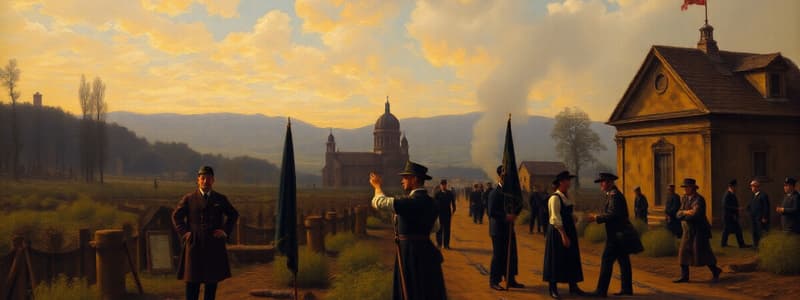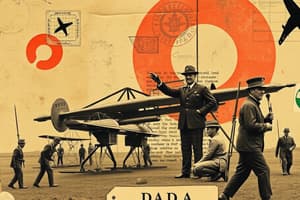Podcast
Questions and Answers
Which three countries were part of the Triple Entente?
Which three countries were part of the Triple Entente?
- Italy, Germany, Great Britain
- France, Russia, Great Britain (correct)
- Austria-Hungary, Russia, France
- Germany, Austria-Hungary, Italy
Kaiser Wilhelm II played a minor role in the outbreak of WW1.
Kaiser Wilhelm II played a minor role in the outbreak of WW1.
False (B)
What was the main reason most men gave for enlisting in WW1?
What was the main reason most men gave for enlisting in WW1?
King and Country
The British first effectively used ______ in 1916.
The British first effectively used ______ in 1916.
Match the event with its date:
Match the event with its date:
Which country first used poison gas in the war?
Which country first used poison gas in the war?
The Turnip Winter refers to the time of severe food shortages in Germany between 1916 and 1917.
The Turnip Winter refers to the time of severe food shortages in Germany between 1916 and 1917.
Approximately how many British soldiers served in WW1?
Approximately how many British soldiers served in WW1?
Franz Ferdinand was the arch-Duke of ______.
Franz Ferdinand was the arch-Duke of ______.
What was the nickname of Field Marshall Haig during WW1?
What was the nickname of Field Marshall Haig during WW1?
What was the primary reason men enlisted in WW1?
What was the primary reason men enlisted in WW1?
The nickname for Field Marshall Haig was 'The Butcher of the Somme.'
The nickname for Field Marshall Haig was 'The Butcher of the Somme.'
When was the Armistice signed?
When was the Armistice signed?
Kaiser Wilhelm II fled to ______ towards the end of WW1.
Kaiser Wilhelm II fled to ______ towards the end of WW1.
Which country first used poison gas in WW1?
Which country first used poison gas in WW1?
Match the following key events with their corresponding dates:
Match the following key events with their corresponding dates:
Approximately 250,000 men were underage when they enlisted.
Approximately 250,000 men were underage when they enlisted.
What was the common disease men caught due to trench conditions?
What was the common disease men caught due to trench conditions?
The time of severe food shortages in Germany between 1916-7 was known as the ______.
The time of severe food shortages in Germany between 1916-7 was known as the ______.
How much were ordinary soldiers paid as privates in the army?
How much were ordinary soldiers paid as privates in the army?
What was one of the major humanitarian consequences of new weapons used in WWI?
What was one of the major humanitarian consequences of new weapons used in WWI?
How did WWI influence societal change during its course?
How did WWI influence societal change during its course?
What was a direct outcome of the Treaty of Versailles for Germany?
What was a direct outcome of the Treaty of Versailles for Germany?
Which of the following best describes the concept of 'Total War' as it applied to WWI?
Which of the following best describes the concept of 'Total War' as it applied to WWI?
What role did propaganda and censorship play during WWI?
What role did propaganda and censorship play during WWI?
What was a significant immediate cause of World War I?
What was a significant immediate cause of World War I?
Which two sides composed the major powers in World War I?
Which two sides composed the major powers in World War I?
Which factor contributed significantly to the escalation of World War I?
Which factor contributed significantly to the escalation of World War I?
What was a notable characteristic of fighting on the Western Front during World War I?
What was a notable characteristic of fighting on the Western Front during World War I?
Which Eastern European country fought against the Central Powers during World War I?
Which Eastern European country fought against the Central Powers during World War I?
What was the main impact of the alliance system prior to World War I?
What was the main impact of the alliance system prior to World War I?
Which of the following did NOT significantly contribute to nationalism leading up to World War I?
Which of the following did NOT significantly contribute to nationalism leading up to World War I?
What was a common feature of trench warfare experienced by soldiers?
What was a common feature of trench warfare experienced by soldiers?
Flashcards
Triple Entente members
Triple Entente members
France, Russia, and Great Britain formed the Triple Entente.
Triple Alliance members
Triple Alliance members
Germany, Italy, and Austria-Hungary formed the Triple Alliance.
German Kaiser
German Kaiser
Wilhelm II was the German Kaiser (King) during WWI.
Archduke Franz Ferdinand
Archduke Franz Ferdinand
Signup and view all the flashcards
WWI British soldiers' pay
WWI British soldiers' pay
Signup and view all the flashcards
British soldiers enlistment reason
British soldiers enlistment reason
Signup and view all the flashcards
British soldiers in WWI
British soldiers in WWI
Signup and view all the flashcards
Underage British recruits
Underage British recruits
Signup and view all the flashcards
Largest British Colony's WWI troops
Largest British Colony's WWI troops
Signup and view all the flashcards
British WWI invention
British WWI invention
Signup and view all the flashcards
What sparked WWI?
What sparked WWI?
Signup and view all the flashcards
Triple Alliance
Triple Alliance
Signup and view all the flashcards
Triple Entente
Triple Entente
Signup and view all the flashcards
Wilhelm II
Wilhelm II
Signup and view all the flashcards
Battle of Mons
Battle of Mons
Signup and view all the flashcards
Battle of the Somme
Battle of the Somme
Signup and view all the flashcards
Spring Offensive
Spring Offensive
Signup and view all the flashcards
The Tank
The Tank
Signup and view all the flashcards
Trench Foot
Trench Foot
Signup and view all the flashcards
Turnip Winter
Turnip Winter
Signup and view all the flashcards
New Weapons
New Weapons
Signup and view all the flashcards
Total War
Total War
Signup and view all the flashcards
Propaganda and Censorship
Propaganda and Censorship
Signup and view all the flashcards
Loss of Life
Loss of Life
Signup and view all the flashcards
Treaty of Versailles
Treaty of Versailles
Signup and view all the flashcards
WWI's Spark
WWI's Spark
Signup and view all the flashcards
Alliance System: Chain Reaction
Alliance System: Chain Reaction
Signup and view all the flashcards
Nationalism: Identity
Nationalism: Identity
Signup and view all the flashcards
Imperialism: Resources
Imperialism: Resources
Signup and view all the flashcards
Militarism: Might
Militarism: Might
Signup and view all the flashcards
Eastern Front: Large-Scale Battles
Eastern Front: Large-Scale Battles
Signup and view all the flashcards
Western Front: Trench Warfare
Western Front: Trench Warfare
Signup and view all the flashcards
Stalemate: Attrition
Stalemate: Attrition
Signup and view all the flashcards
Study Notes
Causes of World War 1
- Germany formed in 1871
- Triple Entente: France, Russia, Great Britain
- Triple Alliance: Germany, Italy, Austria-Hungary
- Kaiser Wilhelm II, a key figure in the war, was the German King
- Franz Ferdinand, Archduke of Austria-Hungary, was assassinated in June 1914
Experience of World War 1
- Low-level soldiers were paid 50 pence a fortnight
- Primary reason for enlisting: King and Country
- Approximately 5 million British soldiers served
- Approximately 250,000 soldiers were underage when they enlisted
- India contributed 1 million soldiers
- The Tank was first used effectively by Britain
- Poison gas was first used by Germany
- Jam sandwiches and Trench foot were common experiences
- The "Butcher of the Somme" Field Marshal Haig, led to 58,000 casualties at the Somme
End of World War 1
- The Turnip Winter was a time of severe food shortages (1916-1917) in Germany
- Russia left the war
- 1.4 million American soldiers were in France by August 1918
- Kaiser Wilhelm II fled to Holland
- The Armistice was signed on 11th November 1918
- Key Dates: 28th June 1914 to 11th November 1918
Studying That Suits You
Use AI to generate personalized quizzes and flashcards to suit your learning preferences.




